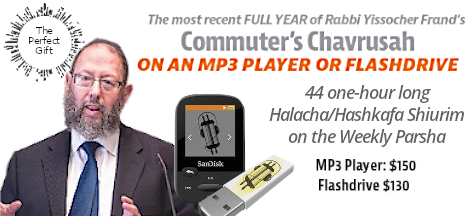

These divrei Torah were adapted from the hashkafa portion of Rabbi Yissocher Frand’s Commuter Chavrusah Tapes on the weekly portion: # 1325 Finding a $20 Bill in Shul / Finding A Comb in a Mikvah: Can You Keep It? Good Shabbos!
Parshas Misphatim begins with the eved Ivri (Hebrew slave). A person who stole, and who could not make proper restitution for the stolen items, is sold as an eved Ivri. The proceeds of the sale are used to pay back the victim of his robbery. Even though he is a full-fledged Jew, his master has the right to give him a shifcha Canaanis for the purpose of fathering children, who will all belong to the master.
There are several halachos regarding the treatment of an eved Ivri. The Gemara in Kiddushin says that the food and drink served to an eved Ivri must match the food and drink served to the master. This means that if the master eats steak for supper, the eved Ivri needs to be served steak. He is not a second-class citizen. He is treated like any other member of the family. Likewise, it is forbidden for the slave owner to sleep on a deluxe mattress and expect his slave to sleep on straw. What you eat, he eats. Where you sleep, he sleeps. The Gemara famously concludes that whoever purchases an eved Ivri has, in effect, purchased a master for himself (Kiddushin 20a).
Tosfos there bring a fascinating Talmud Yerushalmi, which states that if the household only owns one pillow, the master has no choice but to give the pillow to his eved Ivri, rather than take it for himself. He can’t even say “neither of us will use the pillow.” Why is this the case? It is because we need to be sensitive to the feelings of the eved. The master is a free man. He does not suffer from a persecution complex or feel discriminated against. If he needs to sleep without a pillow, then – nu – he sleeps without a pillow. The eved, on the other hand, will feel persecuted and discriminated against if he sleeps without a pillow. We can’t let him feel that he is being degraded. “Ki tov lo imach” (for it is good for him by you) (Devarim 15:16)!
All this brings us to the following question: If we need to treat our avadim (plural of eved) with such utmost respect, how is it that the Torah allows us to provide him with a shifcha Canaanis? Is that not degrading? Will that not make him feel that he is somehow of lower stature? The same person who we are so worried about that at supper time he needs to have steak just like his master, now at night should live with a shifcha Canaanis! Why is that alright?
Then, even more difficult than the fact that he produces slaves for his master is the fact that after working for the master for six years, he is told that he needs to leave the master’s home but his ‘wife’ and kids stay with the master! Is that treating the eved with honor and respect? Certainly not! He is treated like chattel!
Rav Matisyahu Solomon once said in the name of ‘chacham echad‘ that what we are trying to do over here is to rehabilitate this eved Ivri. We are trying to send him a message: Don’t ever steal again. When a person steals, he steals for money. He takes someone else’s property. But he also fails to realize the emotional attachment that the victim has to the item he is taking.
For example, our wives light Shabbos candles with their special Shabbos leichter (candlesticks). How would they feel if someone stole their Shabbos leichter? They would be devastated. Women have a strong attachment to their Shabbos leichter. My wife has her mother’s Shabbos leichter. Shabbos candles have been lit on those candlesticks in her family for who knows how many decades. My wife has a strong emotional attachment to those candlesticks and would be devastated if they would be taken from her. It would not be just a monetary loss. The insurance would pay that back, but these are my leichter!
There are some things (like random pens) that we may not mind at all if someone takes and doesn’t return. There are other things (like a car) that the hassle involved in submitting an insurance claim and needing to look for a new car would make us very upset, but ultimately, we would get over such a loss. However, for instance, I have a Seder plate that was my father’s Seder plate. I am attached to it. It is an heirloom! If chas v’shalom someone came into my house and stole it, it is not only a monetary loss. It is an emotional punch in the stomach.
When a person steals, he fails to take that into account. He is not just taking away money. He may be stealing items to which the victim has a strong emotional attachment. How do we teach a person never to do that again? We teach him by having him establish a strong emotional attachment – to a shifcha Canaanis, with whom he lives with for six years, and to his sons and daughters that he has brought into the world and raised with this shifcha Canaanis, and then, at the end of the six years, guess what? He needs to leave his wife and his children. On a smaller level, that is what he did to the person from whom he stole. We want to teach him that he lacked the sensitivity to the reality that people can become attached to things.
The point of the service of an eved Ivri is not merely punishment or reimbursement. This status as an eved Ivri is meant to be rehabilitative. We are teaching a lesson: When the Torah says Lo sigzol (Don’t steal!), it is not just about money. There is attachment and there is sensitivity, which you failed to recognize.
Perhaps we can ask that the eved Ivri can avoid this lesson by using another option: He can say: “I love my wife and my children. I want to stay with my master.” In that case, there is another way of teaching him. We take him to the doorpost and we put a peg through his ear. He failed to hear the commandments against theft (Lo signov; Lo sigzol) on Har Sinai. There are two ways of teaching him this lesson of how destructive it is to steal:
Number 1 – We teach him what it means to be attached (by letting him marry and raise children and then taking his wife and kids away from him).
Number 2 – We put a peg through his ear, which is not a pleasant experience. There is no anesthesia when we do that. We do it because he needs to remember what he heard (at Sinai). Apparently, he didn’t hear when the Almighty commanded Lo sigzol.
This also answers another question. Why do we wait six years to put the peg through his ear? The person who violated Lo sigzol did so more than six years earlier. Why don’t we send him this message immediately? You didn’t hear the command not to steal on Sinai: We are going to teach your ear a lesson!
The answer is that this is a punishment of last resort. We prefer to teach him the lesson of what it means not to steal by his master giving him a shifcha Canaanis and letting the children stay with the master. Now, if after six years he still hasn’t learned that lesson, we have no other choice. But now the only way we can teach him the lesson of what it means to listen to Lo sigzol, is by piercing his ear.
Transcribed by David Twersky; Jerusalem [email protected]
Technical Assistance by Dovid Hoffman; Baltimore, MD [email protected]
This week’s write-up is adapted from the hashkafa portion of Rabbi Yissochar Frand’s Commuter Chavrusah Series on the weekly Torah portion. A listing of the halachic portions for Parshas Mishpatim is provided below:
- # 043 Malpractice
- # 086 Withholding Medical Treatment
- # 134 Hashovas Aveida: Returning Lost Objects
- # 181 Medicine, Shabbos, and the Non-Jew
- # 227 Taking Medication on Shabbos
- # 271 Experimental Medical Treatment
- # 317 Wrecking a Borrowed Car
- # 361 Bankruptcy
- # 405 Litigating in Secular Courts
- # 449 Is Gambling Permitted
- # 493 Bitul B’rov
- # 537 Losing Your Coat at a Coat Check
- # 581 Lending Without Witnesses
- # 625 The Kesuba
- # 669 Rabbinical Contracts
- # 713 Adam Hamazik & Liability Insurance
- # 757 Midvar Sheker Tirchak: True or False?
- # 801 Oy! My Wallet Went Over Niagara Falls
- # 845 Is Hunting a Jewish Sport?
- # 889 The Neighbor Who Forgot To Turn Off The Fire
- # 933 The Mitzvah of Lending Money
- # 976 Will Any Doctor Do?
- # 1020 The Potato Baked in a Fleishig Pan – With Butter or Margarine?
- # 1064 The Doctor That Erred
- # 1107 5772 or 2012 What Should It Be?
- # 1150 Taking State Farm To Beis Din
- # 1193 “Dayan, If You Know What’s Good For You, Rule In My Favor”
- # 1237 The Case of the Sefer That Was Borrowed and Never Returned
- # 1282 Treating Ebola Patients; The Har Nof Massacre and Kidney Donations
- # 1325 Finding a $20 Bill in Shul / Finding A Comb in a Mikvah: Can You Keep It?
- # 1369 Lending Money Without Receiving an IOU Slip – Is It Mutar?
- # 1413 Reinstituting the Sanhedrin in Our Day and Age?
- # 1457 Milchig Bread and the Bimbo Bakery Controversy
- # 1501 My Neighbor’s Son Threw a Ball Through My Front Window – Who Pays?
- # 1544 Must I Buy From A Jewish Merchant or Can I Buy From Amazon?
- # 1587 Using Alternative Medicine Rather Than Traditional Medicine – Is There a Problem?
A complete catalogue can be ordered from the Yad Yechiel Institute, PO Box 511, Owings Mills MD 21117-0511. Call (410) 358-0416 or e-mail [email protected] or visit http://www.yadyechiel.org/ for further information.


